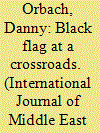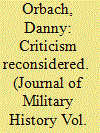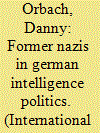|
|
|
Sort Order |
|
|
|
Items / Page
|
|
|
|
|
|
|
| Srl | Item |
| 1 |
ID:
125666


|
|
|
|
|
| Publication |
2013.
|
| Summary/Abstract |
A political trial, according to Steven E. Barkan, is a trial revolving around highly publicized legal controversies. In some cases, such a trial may determine fundamental political questions, exceeding the legal realm, which are in debate inside a given polity. The 1957-58 trial related to the 1956 massacre in Kafr Qasim, Israel certainly belongs to this category. The trial established the doctrine of a "manifestly unlawful order" in Israeli military law, contributed considerably to the reshaping of civil-military relations, and influenced the civic status of the Arab minority in Israel. In this article, using hitherto underexamined primary sources, I argue that the most important contribution of the trial, the doctrine of a "manifestly unlawful order," was not only a creation of the bench but also a result of a complicated interaction between the actors present in the courtroom: the defendants, their defense lawyers, the prosecutors, and the judges. Above all, the article shows how the bitter struggle between the two main attorneys helped shape the doctrine of a "manifestly unlawful order," that is, an order that is illegal for a soldier to obey.
|
|
|
|
|
|
|
|
|
|
|
|
|
|
|
|
| 2 |
ID:
103800


|
|
|
| 3 |
ID:
191084


|
|
|
|
|
| Summary/Abstract |
The early history of the postwar West German foreign intelligence service is replete with accounts of former Nazi security officers who were recruited by the newly founded service thanks to their professional experience, connections, and anti-Soviet credentials, only to later be exposed as Soviet moles. Focusing on the case of Heinz Felfe, this article puts forward the argument that the reaction of a secret service to the impending exposure of moles can be even more harmful than their actual activity. Enemy moles in intelligence organizations are dangerous in more than one way. They cause damage, of course, when they operate in the dark, but also cause just as much, and even more, damage when exposed. The fear of public scandal incentivizes irrational behavior, aggravating rather than decreasing the dangers facing the service.
|
|
|
|
|
|
|
|
|
|
|
|
|
|
|
|
| 4 |
ID:
192673


|
|
|
|
|
| Summary/Abstract |
On 29 October 1956, the first day of the Suez War, detachments of the Israeli Border Police massacred forty-seven Arab men, women, and children in the village of Kafr Qasim. Although the government and army denounced the atrocity, some historians have since argued that the massacre was planned by high-level military and government circles. The government’s goal, according to this view, was to drive the Arab villagers across the border in line with a contingency plan known as Operation Mole. We present an alternative view based on new documents: rather than being either part of a preconceived plan of expulsion or an aberrant individual crime, the massacre was in fact a result of an Israeli deception plan that got out of hand.
|
|
|
|
|
|
|
|
|
|
|
|
|
|
|
|
| 5 |
ID:
175858


|
|
|
|
|
| Summary/Abstract |
The Japanese ninja are known in the west mainly by the romantic image of the secret agent, or assassin, endowed with superhuman powers. Yet there is a lack of serious scholarship on the actual warriors who became the subject of the myth. This paper seeks to use the full extent of primary sources from the period to offer a blueprint for a historical, rather than mythical understanding of the ninja. They did not belong to a unified class, but were instead a hodgepodge of heterogeneous groups, united only by their skills in irregular warfare. They became “ninja” only retrospectively, as a result of the historical imagination of later generations.
|
|
|
|
|
|
|
|
|
|
|
|
|
|
|
|
| 6 |
ID:
164879


|
|
|
|
|
| Summary/Abstract |
Japanese imperialism was one of the most important driving forces in the history of modern East Asia. One influential group of actors at the grassroots level were the so-called ‘continental adventurers’ (tairiku rōnin)—Japanese nationals who travelled in Korea and China on the lookout for adventures and employment opportunities. Some of them worked part time for the army as spies, translators, and agents for special operations. These adventurers have been studied before as agents of Japanese imperialism, but existing accounts fail to present a convincing model of the mechanism that made their activities effective. The goal of this article is to fill this gap.
This mechanism, which I shall hereafter call ‘the military-adventurous complex’, was a lobby of officers, continental adventurers, businessmen, politicians, criminal elements as well as Chinese, Manchurian, and Mongolian revolutionaries. The interests of these contingents were unique but nevertheless intertwining. Despite its decentralized character, the military-adventurous complex had a significant impact on Japanese foreign policy over an extended period. In this article, we shall explore the contours, structure, and modus operandi of that complex, its ambivalent relationship with the Japanese state, as well as several examples of its operations in the early twentieth century. Finally, we shall dwell on the ramifications of the complex on the development of Japanese imperialism.
|
|
|
|
|
|
|
|
|
|
|
|
|
|
|
|
| 7 |
ID:
115333


|
|
|
|
|
| Publication |
2012.
|
| Summary/Abstract |
Tyrannicide, that is, assassinating one's own leader in order to take over the government and/or to dramatically influence policy, carries multiple difficulties and mortal perils for the people involved. One of them has to do with a latent danger which may only come into view after a successful assassination, followed by a takeover of the government by the assassin or people ideologically close to him; the new elites, after overthrowing the old ones, may be exposed to the same fate of violent removal. This may open a Pandora's Box of murders and counter-murders that tyrannicide perpetrators will undoubtedly wish to avoid. Given this fact, some assassins (and/or their ideological cohorts) invested a lot of time and effort to rigorously explain why this specific leader, and no other, could and should be killed. Why their assassination is unique and justified, while similar behaviour by others is not. Hence, the ideological structures behind tyrannicide are not only intended to justify it in the simple sense of the word, but also to prevent it from repeating itself endlessly. These elaborate ideological structures, and, more specifically, the form they took in the thought of two Egyptian radical Islamic writers, Sayyid Qutb and Abd al-Salam Faraj, are the locus of our discussion in the present paper.
|
|
|
|
|
|
|
|
|
|
|
|
|
|
|
|
|
|
|
|
|